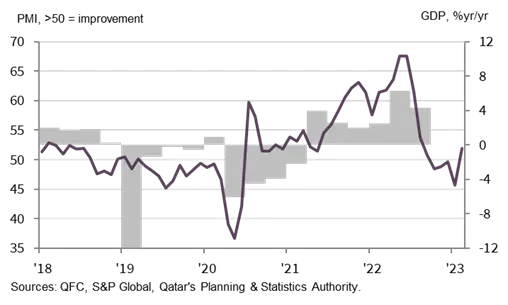PHOTO
- PMI rises to six-month high as activity and new orders rebound
- Future Output Index improves further to 41-month high
- Wage pressures build in February
Data were collected 10-21 February 2023
Doha, Qatar:– The latest Purchasing Managers’ Index™ (PMI™) survey data from Qatar Financial Centre (QFC) for February indicated a rebound in business activity as demand improved. This drove firms' expectations for the next 12 months to the highest since September 2019.
The Qatar PMI indices are compiled from survey responses from a panel of around 450 private sector companies. The panel covers the manufacturing, construction, wholesale, retail, and services sectors, and reflects the structure of the non-energy economy according to official national accounts data.
The headline Qatar Financial Centre PMI is a composite single-figure indicator of non-energy private sector performance. It is derived from indicators for new orders, output, employment, suppliers’ delivery times and stocks of purchases.
The PMI posted a marked increase from 45.7 in January to 51.9 in February, indicating a resurgence in overall business conditions following a brief correction at the start of 2023 following the FIFA World Cup Qatar 2022™ tournament. The month-on-month rise in the headline figure, at 6.2 points, was the second-largest observed since the series began in April 2017 and the largest outside the pandemic era (the biggest ever rise of 17.7 points occurred in July 2020).
The main boosts to the headline PMI were renewed growth in output and new business, which both increased at rates broadly comparable with their long-run averages following corrections in January. There was a notable rebound in demand in the wholesale & retail sector.
Forward-looking data continued to highlight improving prospects for the non-energy private sector in February. The Future Output Index rose for the seventh month running to a 41-month high of 82.7, indicating a strong degree of optimism. The Index has risen by a combined 21 points in 2023 so far, the largest two-month gain over the series history. Confidence improved in all four main sectors in February, with the strongest overall sentiment seen among manufacturers. Anecdotal evidence provided by respondents widely mentioned the initiation of new projects and successful marketing campaigns.
February data indicated growing wage pressures, with the Staff Costs Index at a 17-month high. Salary increases were linked to both new recruits and improved rewards for existing staff. The Employment Index, tracking the overall level of staffing, was little-changed from January's six-month high.
Overall cost pressures eased slightly since January, reflecting a decline in purchase prices. Meanwhile, firms raised charges for goods and services for the ninth time in ten months.
Companies continued to complete backlogged work in February, although the respective index rose to a five-month high, signalling some returning pressure on capacity due to rising demand.
QFC Qatar PMI™ vs. GDP


Financial Services
Strongest inflows of new business for six months
- Financial Services New Business Index at 60.1
- Current activity levels and expectations remain elevated
- Record rise in charges for financial services
The financial services sector in Qatar continued to expand at a marked rate in February as the volume of new business increased the most since August 2022. Activity increased for the twentieth successive month, and at a rapid pace, while expectations eased only slightly on January's recent peak.
New business grew for the thirty-third consecutive month in February, and at the fastest rate since last August. Meanwhile, financial services firms continued to expand their headcounts at a robust pace.
February data indicated a record increase in charges levied by financial services firms, with the Prices Charged Index surging to 62.8. In contrast, the Input Prices Index fell to 50.2, indicating almost no increase in average costs.
Comment
Yousuf Mohamed Al-Jaida, Chief Executive Officer, QFC Authority:
“The latest set of results suggest that business conditions in the non-energy private sector have normalised following a correction at the start of the year, with the February headline PMI reading of 51.9 broadly in line with the long-run average of 52.2.
"The key indices for output and new orders both rebounded solidly, with demand improving across all four of the main sectors monitored. Similarly, the Future Output Index rose further to a 41-month high of 82.7 in February, well above the long-run average of 64.6. Firms widely reported the beginning of new projects and successful marketing campaigns, which also boosted confidence in the outlook. "
“The financial services sector experienced significant growth and expansion in February, with strong inflows of new business, elevated activity levels, and robust headcount expansion. Additionally, the record rise in charges levied by financial services firms indicates their capability to command higher prices for their services.”
-Ends-
ABOUT THE QATAR FINANCIAL CENTRE
The Qatar Financial Centre (QFC) is an onshore business and financial centre located in Doha, providing an excellent platform for firms to do business in Qatar and the region. The QFC offers its own legal, regulatory, tax and business environment, which allows up to 100% foreign ownership, 100% repatriation of profits, and charges a competitive rate of 10% corporate tax on locally sourced profits.
The QFC welcomes a broad range of financial and non-financial services firms.
For more information about the permitted activities and the benefits of setting up in the QFC, please visit qfc.qa
MEDIA CONTACTS
QFC: Rasha Kamaleddine, Marketing & Corporate Communications Department, r.kamaleddine@qfc.qa
ENQUIRIES ABOUT THE REPORT
QFC: qatarpmi@qfc.qa
ABOUT S&P GLOBAL
S&P Global (NYSE: SPGI) S&P Global provides essential intelligence. We enable governments, businesses and individuals with the right data, expertise, and connected technology so that they can make decisions with conviction. From helping our customers assess new investments to guiding them through ESG and energy transition across supply chains, we unlock new opportunities, solve challenges, and accelerate progress for the world.
We are widely sought after by many of the world’s leading organizations to provide credit ratings, benchmarks, analytics and workflow solutions in the global capital, commodity, and automotive markets. With every one of our offerings, we help the world’s leading organizations plan for tomorrow, today. www.spglobal.com.
ABOUT PMI
Purchasing Managers’ Index™ (PMI™) surveys are now available for over 40 countries and for key regions including the Eurozone. They are the most closely watched business surveys in the world, favoured by central banks, financial markets and business decision makers for their ability to provide up-to-date, accurate and often unique monthly indicators of economic trends.
https://ihsmarkit.com/products/pmi.html.
METHODOLOGY
The Qatar Financial Centre PMI™ is compiled by S&P Global from responses to questionnaires sent to purchasing managers in a panel of around 450 private sector companies. The panel is stratified by detailed sector and company workforce size, based on contributions to GDP. The sectors covered by the survey include manufacturing, construction, wholesale, retail, and services.
Survey responses are collected in the second half of each month and indicate the direction of change compared to the previous month. A diffusion index is calculated for each survey variable. The index is the sum of the percentage of ‘higher’ responses and half the percentage of ‘unchanged’ responses. The indices vary between 0 and 100, with a reading above 50 indicating an overall increase compared to the previous month, and below 50 an overall decrease. The indices are then seasonally adjusted.
The headline figure is the Purchasing Managers’ Index™ (PMI). The PMI is a weighted average of the following five indices: New Orders (30%), Output (25%), Employment (20%), Suppliers’ Delivery Times (15%) and Stocks of Purchases (10%). For the PMI calculation the Suppliers’ Delivery Times Index is inverted so that it moves in a comparable direction to the other indices.
Underlying survey data are not revised after publication, but seasonal adjustment factors may be revised from time to time as appropriate which will affect the seasonally adjusted data series.
Data were collected 10-21 February 2023.
For further information on the PMI survey methodology, please contact economics@ihsmarkit.com.
CONTACT
S&P Global: Sabrina Mayeen
E. Sabrina.mayeen@spglobal.com




















